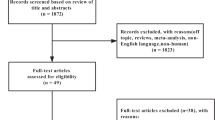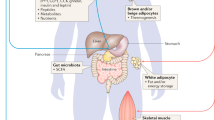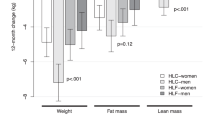Abstract
With the rising prevalence of both obesity and diabetes, the contributing role of diet to the prevention and treatment of these conditions has become a major focus of research, clinical practice, and public policy. There has been intense debate over which dietary regimens might be most effective for weight loss, with interest centered on the potential for specific dietary macronutrients to affect body composition, metabolism, and overall health. This Review addresses two regimens with distinct macronutrient prescriptions that have been widely touted as being beneficial for weight loss and/or metabolic profile: diets low in carbohydrate and diets high in monounsaturated fat. Although data from recent randomized, controlled trials suggest these popular diets may be useful for weight control, cardiovascular health, and glycemic control, longer studies of the efficacy and safety of varying macronutrient content are needed to strengthen the evidence base for nutritional recommendations. Until more support for specific macronutrient combinations is available, practitioners can recommend an array of diets with moderate amounts of macronutrients, tailored to individual needs and preferences.
Key Points
-
Although diets with distinct variations in carbohydrate, protein, and fat may offer potential health benefits, long-term clinical trials are needed to test the effectiveness and safety of these diets
-
Until more evidence for specific macronutrient combinations is available, practitioners can recommend an array of diets with moderate amounts of macronutrients, tailored to the needs and preferences of patients
This is a preview of subscription content, access via your institution
Access options
Subscribe to this journal
Receive 12 print issues and online access
$209.00 per year
only $17.42 per issue
Buy this article
- Purchase on Springer Link
- Instant access to full article PDF
Prices may be subject to local taxes which are calculated during checkout
Similar content being viewed by others
References
Ogden CL et al. (2006) Prevalence of overweight and obesity in the United States, 1999–2004. JAMA 295: 1549–1555
Sullivan PW et al. (2005) Obesity, inactivity, and the prevalence of diabetes and diabetes-related cardiovascular comorbidities in the U.S., 2000–2002. Diabetes Care 28: 1599–1603
NHLBI Obesity Education Initiative Expert Panel on the Identification, Evaluation, and Treatment of Overweight and Obesity in Adults (1998) Clinical Guidelines on the Identification, Evaluation, and Treatment of Overweight and Obesity in Adults: the Evidence Report [http://www.nhlbi.nih.gov/guidelines/obesity/ob_gdlns.pdf] (accessed 29 November 2007)
American Diabetes Association (2007) Nutrition Recommendations and Interventions for Diabetes: a position statement of the American Diabetes Association. Diabetes Care 30 (Suppl 1): S48–S65
Knowler WC et al. (2002) Reduction in the incidence of type 2 diabetes with lifestyle intervention or metformin. N Engl J Med 346: 393–403
Tuomilehto J et al. (2001) Prevention of type 2 diabetes mellitus by changes in lifestyle among subjects with impaired glucose tolerance. N Engl J Med 344:1343–1350
Institute of Medicine (2006) Dietary Reference Intakes. Washington, DC: National Academies Press
Mann JI (2006) Evidence-based nutrition recommendations for the treatment and prevention of type 2 diabetes and the metabolic syndrome. Food Nutr Bull 27: 161–166
Lichtenstein AH et al. (2006) Diet and lifestyle recommendations revision 2006: a scientific statement from the American Heart Association Nutrition Committee. Circulation 114: 82–96
Mann JI (2006) Nutrition recommendations for the treatment and prevention of type 2 diabetes and the metabolic syndrome: an evidenced-based review. Nutr Rev 64: 422–427
Ornish D (2001) Eat More, Weigh Less: Dr. Dean Ornish's Advantage Ten Program for Losing Weight Safely While Eating Abundantly. New York: Quill
Atkins R (1992) Dr. Atkins' New Diet Revolution. New York: Avon Books
Freedman MR et al. (2001) Popular diets: a scientific review. Obes Res 9 (Suppl 1): 1S–40S
Gaesser GA (2007) Carbohydrate quantity and quality in relation to body mass index. J Am Diet Assoc 107: 1768–1780
Alford BB et al. (1990) The effects of variations in carbohydrate, protein, and fat content of the diet upon weight loss, blood values, and nutrient intake of adult obese women. J Am Diet Assoc 90: 534–540
Wing RR et al. (1995) Cognitive effects of ketogenic weight-reducing diets. Int J Obes Relat Metab Disord 19: 811–816
Golay A et al. (1996) Similar weight loss with low- or high-carbohydrate diets. Am J Clin Nutr 63: 174–178
Golay A et al. (1996) Weight-loss with low or high carbohydrate diet? Int J Obes Relat Metab Disord 20: 1067–1072
Brehm BJ et al. (2003) A randomized trial comparing a very low carbohydrate diet and a calorie-restricted low fat diet on body weight and cardiovascular risk factors in healthy women. J Clin Endocrinol Metab 88: 1617–1623
O'Brien KD et al. (2005) Diet-induced weight loss is associated with decreases in plasma serum amyloid A and C-reactive protein independent of dietary macronutrient composition in obese subjects. J Clin Endocrinol Metab 90: 2244–2249
Samaha FF et al. (2003) A low-carbohydrate as compared with a low-fat diet in severe obesity. N Engl J Med 348: 2074–2081
Yancy WS Jr et al. (2004) A low-carbohydrate, ketogenic diet versus a low-fat diet to treat obesity and hyperlipidemia: a randomized, controlled trial. Ann Intern Med 140: 769–777
Foster GD et al. (2003) A randomized trial of a low-carbohydrate diet for obesity. N Engl J Med 348: 2082–2090
Stern L et al. (2004) The effects of low-carbohydrate versus conventional weight loss diets in severely obese adults: one-year follow-up of a randomized trial. Ann Intern Med 140: 778–785
Brinkworth GD et al. (2004) Long-term effects of a high-protein, low-carbohydrate diet on weight control and cardiovascular risk markers in obese hyperinsulinemic subjects. Int J Obes Relat Metab Disord 28: 661–670
McAuley KA et al. (2006) Long-term effects of popular dietary approaches on weight loss and features of insulin resistance. Int J Obes (Lond) 30: 342–349
Ebbeling CB et al. (2007) Effects of a low-glycemic load vs low-fat diet in obese young adults: a randomized trial. JAMA 297: 2092–2102
Keogh JB et al. (2007) Effects of weight loss on a low-carbohydrate diet on flow-mediated dilatation, adhesion molecules and adiponectin. Br J Nutr 98: 852–859
Maki KC et al. (2007) Effects of a reduced-glycemic-load diet on body weight, body composition, and cardiovascular disease risk markers in overweight and obese adults. Am J Clin Nutr 85: 724–734
Dansinger ML et al. (2005) Comparison of the Atkins, Ornish, Weight Watchers, and Zone diets for weight loss and heart disease risk reduction: a randomized trial. JAMA 293: 43–53
Krieger JW et al. (2006) Effects of variation in protein and carbohydrate intake on body mass and composition during energy restriction: a meta-regression 1. Am J Clin Nutr 83: 260–274
Nordmann AJ et al. (2006) Effects of low-carbohydrate vs low-fat diets on weight loss and cardiovascular risk factors: a meta-analysis of randomized controlled trials. Arch Intern Med 166: 285–293
Lichtenstein AH (2006) Thematic review series: patient-oriented research. Dietary fat, carbohydrate, and protein: effects on plasma lipoprotein patterns. J Lipid Res 47: 1661–1667
Adam-Perrot A et al. (2006) Low-carbohydrate diets: nutritional and physiological aspects. Obes Rev 7: 49–58
Gardner CD et al. (2007) Comparison of the Atkins, Zone, Ornish, and LEARN diets for change in weight and related risk factors among overweight premenopausal women: the A TO Z Weight Loss Study: a randomized trial. JAMA 297: 969–977
Westman EC et al. (2007) Low-carbohydrate nutrition and metabolism. Am J Clin Nutr 86: 276–284
Franz MJ et al. (2002) Evidence-based nutrition principles and recommendations for the treatment and prevention of diabetes and related complications. Diabetes Care 25: 148–198
Willett WC et al. (1995) Mediterranean diet pyramid: a cultural model for healthy eating. Am J Clin Nutr 61: 1402S–1406S
Keys A (1980) Seven Countries: a Multivariate Analysis of Death and Coronary Heart Disease. Cambridge, MA: Harvard University Press
Garg A et al. (1988) Comparison of a high-carbohydrate diet with a high-monounsaturated-fat diet in patients with non-insulin-dependent diabetes mellitus. N Engl J Med 319: 829–834
Garg A et al. (1992) Comparison of effects of high and low carbohydrate diets on plasma lipoproteins and insulin sensitivity in patients with mild NIDDM. Diabetes 41: 1278–1285
Ginsberg HN et al. (1990) Reduction of plasma cholesterol levels in normal men on an American Heart Association Step 1 diet or a Step 1 diet with added monounsaturated fat. N Engl J Med 322: 574–579
Rasmussen OW et al. (1993) Effects on blood pressure, glucose, and lipid levels of a high-monounsaturated fat diet compared with a high-carbohydrate diet in NIDDM subjects. Diabetes Care 16: 1565–1571
Campbell LV et al. (1994) The high-monounsaturated fat diet as a practical alternative for NIDDM. Diabetes Care 17: 177–182
Garg A et al. (1994) Effects of varying carbohydrate content of diet in patients with non-insulin-dependent diabetes mellitus. JAMA 271: 1421–1428
Gumbiner B et al. (1998) Effects of a monounsaturated fatty acid-enriched hypocaloric diet on cardiovascular risk factors in obese patients with type 2 diabetes. Diabetes Care 21: 9–15
Heilbronn LK et al. (1999) Effect of energy restriction, weight loss, and diet composition on plasma lipids and glucose in patients with type 2 diabetes. Diabetes Care 22: 889–895
Walker KZ et al. (1995) Dietary composition, body weight, and NIDDM. Comparison of high-fiber, high-carbohydrate, and modified-fat diets. Diabetes Care 18: 401–403
Anonymous (1997) Nutrition recommendations and principles for people with diabetes mellitus. Diabetes Care 20: S14–S17
Kris-Etherton PM (1999) AHA science advisory: monounsaturated fatty acids and risk of cardiovascular disease. J Nutr 129: 2280–2284
Toobert DJ et al. (2003) Biologic and quality-of-life outcomes from the Mediterranean Lifestyle Program: a randomized clinical trial. Diabetes Care 26: 2288–2293
Wien MA et al. (2003) Almonds vs complex carbohydrates in a weight reduction program. Int J Obes Relat Metab Disord 27: 1365–1372
Serra-Majem L et al. (2006) Scientific evidence of interventions using the Mediterranean diet: a systematic review. Nutr Rev 64: S27–S47
McManus K et al. (2001) A randomized controlled trial of a moderate-fat, low-energy diet compared with a low fat, low-energy diet for weight loss in overweight adults. Int J Obes Relat Metab Disord 25: 1503–1511
de Lorgeril M et al. (1994) Mediterranean α-linolenic acid-rich diet in secondary prevention of coronary heart disease. Lancet 343: 1454–1459
de Lorgeril M et al. (1996) Effect of a Mediterranean type of diet on the rate of cardiovascular complications in patients with coronary artery disease. Insights into the cardioprotective effect of certain nutriments. J Am Coll Cardiol 28: 1103–1108
de Lorgeril M et al. (1999) Mediterranean diet, traditional risk factors, and the rate of cardiovascular complications after myocardial infarction: final report of the Lyon Diet Heart Study. Circulation 99: 779–785
Sondergaard E et al. (2003) Effect of dietary intervention and lipid-lowering treatment on brachial vasoreactivity in patients with ischemic heart disease and hypercholesterolemia. Am Heart J 145: E19
Singh RB et al. (2002) Effect of an Indo-Mediterranean diet on progression of coronary artery disease in high risk patients (Indo-Mediterranean Diet Heart Study): a randomised single-blind trial. Lancet 360: 1455–1461
Esposito K et al. (2004) Effect of a Mediterranean-style diet on endothelial dysfunction and markers of vascular inflammation in the metabolic syndrome: a randomized trial. JAMA 292: 1440–1446
Brehm B et al. (2007) Randomized clinical trial comparing the effects of high monounsaturated fat and high carbohydrate diets in overweight and obese subjects with type 2 diabetes [abstract]. Diabetes 56: A-17
Acknowledgements
We would like to acknowledge the valuable contributions of our collaborators and research team from our clinical trials: Randy Seeley, Stephen Daniels, Judy Bean, Suzanne Summer, Barbara Lattin, Jane Boback, Lisa Andrews, and Gina Gilchrist. Désirée Lie, University of California, Irvine, CA, is the author of and is solely responsible for the content of the learning objectives, questions and answers of the Medscape-accredited continuing medical education activity associated with this article.
Author information
Authors and Affiliations
Corresponding author
Ethics declarations
Competing interests
The authors declare no competing financial interests.
Rights and permissions
About this article
Cite this article
Brehm, B., D'Alessio, D. Weight loss and metabolic benefits with diets of varying fat and carbohydrate content: separating the wheat from the chaff. Nat Rev Endocrinol 4, 140–146 (2008). https://doi.org/10.1038/ncpendmet0730
Received:
Accepted:
Published:
Issue Date:
DOI: https://doi.org/10.1038/ncpendmet0730
This article is cited by
-
Health Effects of Low-Carbohydrate Diets: Where Should New Research Go?
Current Diabetes Reports (2013)
-
Contemporary strategies for weight loss and cardiovascular disease risk factor modification
Current Cardiovascular Risk Reports (2009)
-
Contemporary strategies for weight loss and cardiovascular disease risk factor modification
Current Atherosclerosis Reports (2008)



